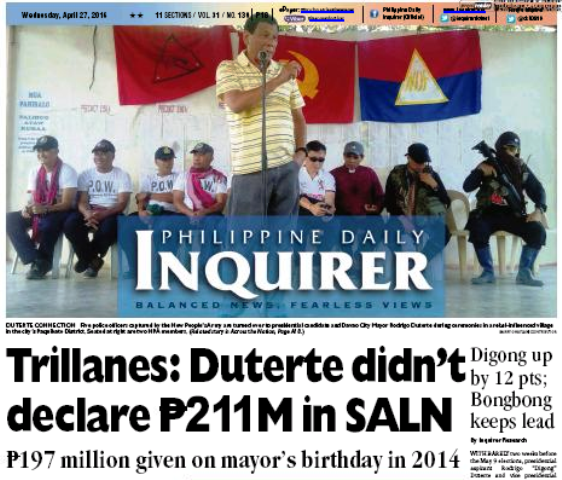Trillanes vs. Duterte: Asking the Tough Questions

Screengrab from the Philippine Daily Inquirer.
ON APRIL 27, based on information provided by vice presidential aspirant and incumbent Senator Antonio Trillanes IV, the Philippine Daily Inquirer broke a story on Davao City Mayor Rodrigo Duterte’s alleged nondisclosure of Php211 million in his Statement of Assets, Liabilities and Net Worth (SALN) (“Trillanes: Duterte didn’t declare P211M in SALN”).
Duterte initially denied having such an account but later admitted it, although he insisted that his account with the Bank of the Philippine Islands (BPI) did not contain the amount Trillanes claimed. Other candidates for president jumped into the fray by criticizing Duterte, who had by then taken the lead in the surveys from previous frontrunner Senator Grace Poe. Trillanes then dared Duterte to face him on May 2 at the BPI Julia Vargas branch in Ortigas Center to look at the bank’s records.
CMFR monitored the reporting on Trillanes’s expose and subsequent developments by the three leading broadsheets (Philippine Daily Inquirer, The Philippine Star, and Manila Bulletin) and primetime newscasts (ABS-CBN 2’s TV Patrol, GMA-7’s 24 Oras, TV5’s Aksyon and CNN Philippines’ Network News) from April 27 to May 2.
He Said, She Said
Reporting by the media on the issue was mostly he-said she-said. The reports took the sides of the parties involved and pitted them against each other by quoting their respective comments. When Trillanes assailed Duterte and the latter responded, the media dutifully followed the exchange of claims and counterclaims, but without checking the veracity of the information from either side. The initial reports did not bother to ask how and where Trillanes obtained the information on which he based his claim.
But the press also sought, obtained and reported the reactions of Duterte’s rivals for the presidency. Poe was the first to react in light of Duterte’s declaration that Trillanes was acting in her behalf, an allegation she denied. The Liberal Party’s Mar Roxas also made the news by daring Duterte to prove that he has no hidden wealth. Vice President Jejomar Binay and Senator Miriam Defensor Santiago also weighed in on the controversy by, as expected, criticizing Duterte.
Doing Better
It was ABS-CBN News Channel (ANC) and CNN Philippines that demonstrated how much better the press could have handled the issue. On April 28, Trillanes was interviewed in CNN Philippines’ Network News. Anchor Pia Hontiveros asked the senator how he obtained the information on Duterte’s accounts. On May 2, ANC’s Dateline Philippines anchors Karmina Constantino and Ron Cruz also interviewed Trillanes via phone patch. The two asked the senator such tough questions as whether he obtained the information from the Anti-Money Laundering Council, who his informant was and whether the latter gained access to the details of Duterte’s supposed account by hacking bank data systems, if he could categorically say the information was not obtained through illegal means, and if there was behind him any group intent on demolishing Duterte.
In the same newscast, Constantino also interviewed Salvador Panelo, Duterte’s lawyer, and asked him why the mayor initially denied the existence of the bank account.
Although such sensational allegations as Trillanes’ are easily attributed to the exigencies of politics during an election season, these are nevertheless newsworthy, involving serious questions about a public figure, in this case someone who could be the next president of the Philippines. The press cannot ignore such opportunities to provide citizens information that can prove crucial to the decisions they will make on Election Day.
Leave a Reply